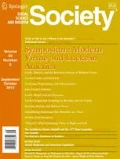Abstract
This article examines the critique of greed in America, with special reference to how that critique of greed varies with economic conditions. American history is characterized by an alternation between celebrations of acquistion and calls for asceticism. This dialectical process illustrates a fundamental cultural contradiction of American capitalism, first discussed by Daniel Bell. The analysis focuses on the disourse of greed during the Great Recession of 2008, and suggests that cultural criticisms of greed have powerful, but limited, political effectiveness. As economic crises continue and people come to blame polticians who fail to resolve them, rather than the “greedy” who are purported to cause them.
Similar content being viewed by others
Notes
See, for instance, a Pew Research Center study of “The People and Their Government” at: http://pewresearch.org/pubs/1569/trust-in-government-distrust-discontent-anger-partisan-rancor
Further Reading
Alexander, J. 2010. The Performance of Politics: Obama’s Victory and the Democratic Struggle for Power. New York and London: Oxford University Press.
Alexander, J. C., & Smith, P. 2001. In J. Turner (Ed.), The Handbook of Sociological Theory. New York: Kluwer.
Balot, R. K. 2001. Greed and Injustice in Classical Athens. Princeton: Princeton University Press.
Bell, D. 1976. The Cultural Contradictions of Capitalism. New York: Basic Books.
Benveniste, É. 1973. Indo-European Language and Society. Translated by Elizabeth Palmer. London: Faber & Faber.
Berger, P., & Luckmann, T. 1966. The Social Construction of Reality: A Treatise in the Sociology of Knowledge. Garden City: Anchor Books.
Boltanski, L., & Chiappello, E. 2007. The New Spirit of Capitalism. London: Verso.
Bourdieu, P. 1984. Distinction: A Social Critique of the Judgment of Taste. Cambridge: Harvard University Press.
Bourdieu, P. 2005. The Social Structures of the Economy. London and New York: Polity.
Derber, C. 2006. The Wilding of America: Money, Mayhem, and the Pursuit of the American Dream. Worth.
Douglas, M., & Ney, S. 1998. Missing Persons: A Critique of Personhood in the Social Sciences. Berkeley: University of California Press.
Elster, J. 1999. Alchemies of the Mind: Rationality and the Emotions. Cambridge: Cambridge University Press.
Giddens, A. 1990. The Consequences of Modernity. Stanford: Stanford University Press.
Hirschmann, A. O. 1997. The Passions and the Interests: Political Arguments for Capitalism Before Its Triumph. New Haven: Yale University Press.
Lyman, S. 1978. The Seven Deadly Sins: Society and Evil. New York: St. Martin’s Press.
Newhauser, R. 2000. The Early History of Greed: The Sin of Avarice in Early Medieval Thought and Literature. Cambridge: Cambridge University Press.
Nussbaum, M. 2001. Upheavals of Thought: The Intelligence of Emotions. Cambridge: Cambridge University Press.
Pew Research Center 2010. The People and Their Government at: http://pewresearch.org/pubs/1569/trust-in-government-distrust-discontent-anger-partisan-rancor.
Sennett, R. 2005. The Culture of the New Capitalism. New Haven: Yale University Press.
Tawney, R.H. 1926. Religion and the Rise of Capitalism. Harmondsworth: Pelican
Weber, M. 1958. The Protestant Ethic and the Spirit of Capitalism. New York: Charles Scribner’s Sons.
Zelizer, V. 1988. Beyond the polemics on the market: establishing a theoretical and empirical agenda. Sociol Forum, 3(4), 614–634.
Author information
Authors and Affiliations
Corresponding author
Rights and permissions
About this article
Cite this article
Cushman, T. The Moral Economy of the Great Recession. Soc 52, 9–18 (2015). https://doi.org/10.1007/s12115-014-9852-4
Published:
Issue Date:
DOI: https://doi.org/10.1007/s12115-014-9852-4



